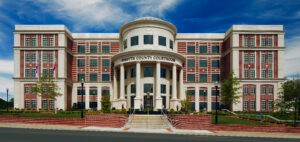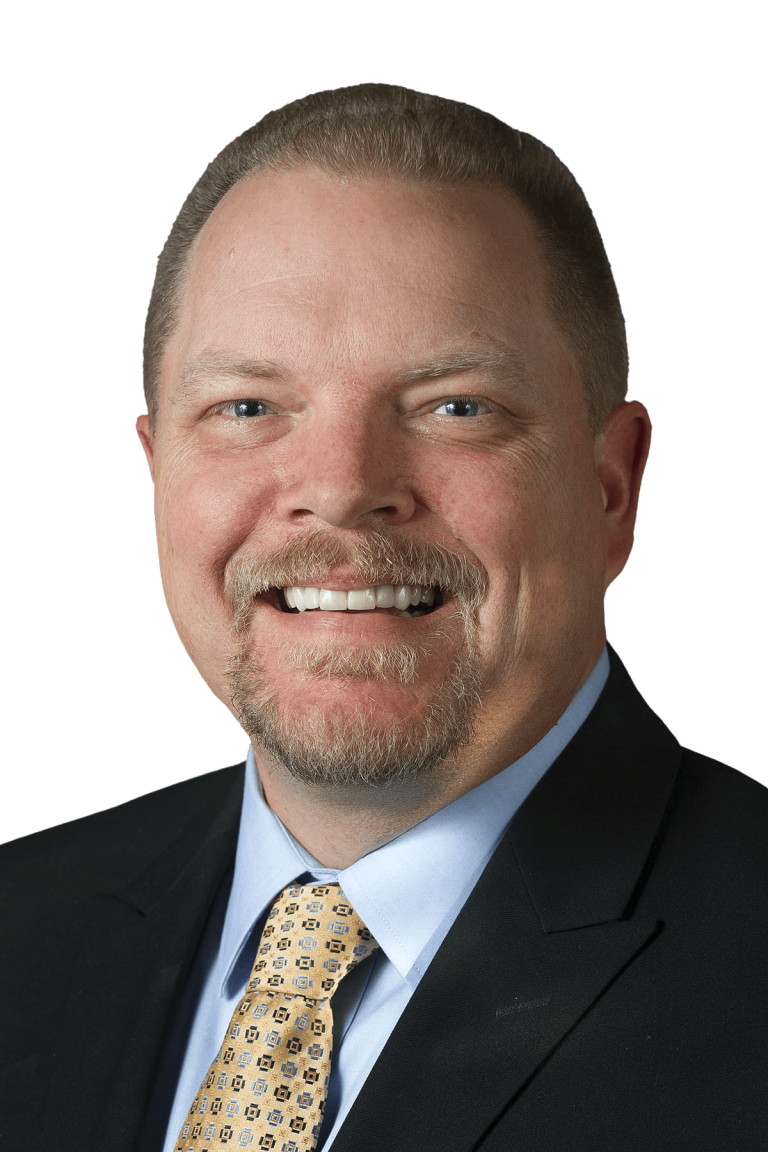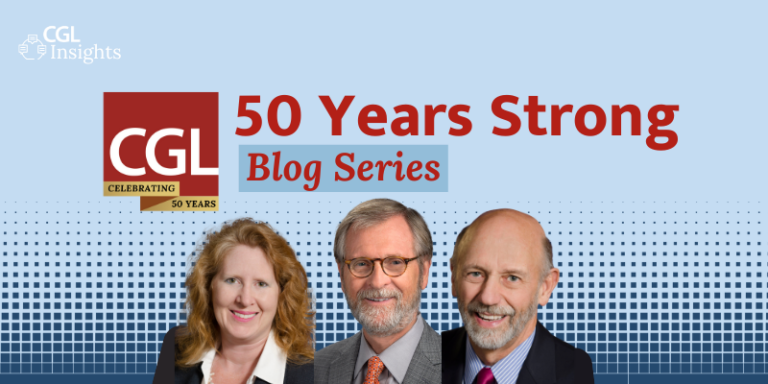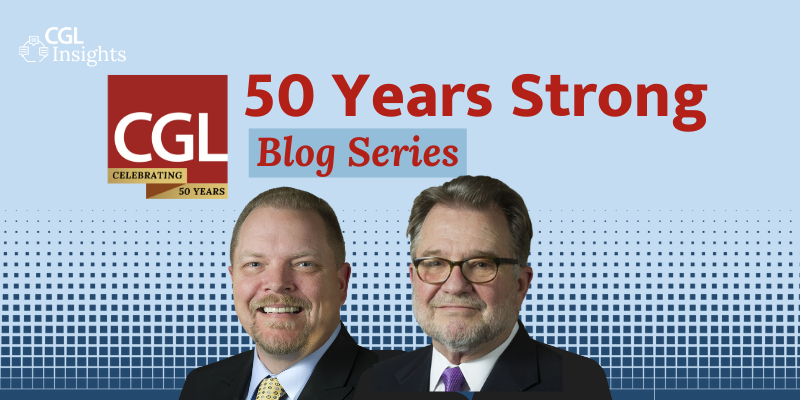
From Vision to Reality: How CGL Redefined Facility Maintenance and Management in Justice
As part of our “50 Years Strong” series celebrating CGL Companies’ 50th anniversary, we’re exploring the rich history and growth of our various service lines. In our first installment, we learned about the impressive journey of CGL’s Planning and Design services.
In today’s post, CGL’s Chief Operating Officer, Gregory Westbrook, FMA, CEFP sits down with Joe E. Lee, PE to discuss the evolution of CGL’s facility maintenance and management division.
Catching Up with Joe Lee: Empowering Facilities to Stand the Test of Time
I had the pleasure of sitting down with my longtime colleague and mentor Joe Lee to discuss the company’s journey, his role as one of its founders, and the growth of the facility maintenance and management division over the years. Our conversation covered everything from the origins of the division, the challenges faced, and the milestones achieved along the way.
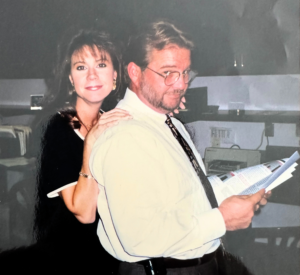
Joe and Donna Lee in the early days of Lee Design and Management.
Joe, could you share the story of how you started what is now CGL Facility Management and what inspired you to take that leap?
Joe Lee: It all started around 1991 when I was working for Rosser International, an architectural and engineering firm. We were doing about 20 to 40 projects a year, mostly in criminal justice, and every time we went back to a previous client, they were frustrated. The jails we helped them build were challenging to maintain because the clients lacked the resources to keep them running efficiently.
I decided to do some research to see if I could find a company that was providing technical and security building maintenance for criminal justice facilities. Granted, this was a bit harder to do before the internet, but eventually, I was introduced to an international facility management company based out of Denmark. We met, and they explained their services. I thought it was a great idea and an excellent service that we could provide our clients.
It was 1991, and the building industry had just been hit by a recession. Counties with decaying facilities were unable to get the funding to build new buildings, additions, or renovations. I thought this would be a good time to introduce facility maintenance. They couldn’t build new; but they could maintain and improve what they had. We could work within their operating budget to not only maintain their buildings but to make them more efficient.
I was unable to generate enough interest or financial support for this idea with my employer; so in 1993, I took a leap of faith to start the company myself. With financial support from a good friend, I decided to start a maintenance company specializing in criminal justice.
My first step was to find a client. I took an RFP that was essentially a medical services RFP for a jail, modified it for maintenance services, and gave it to potential clients. Our first contract came from Clayton County, a 500-bed jail. That led to DeKalb County with a million square feet, which gave us the foundation to grow. The inspiration really stemmed from seeing the need firsthand – clients didn’t have the expertise or the resources to maintain their facilities, and we set out to solve that problem.

Dekalb County Jail
As a founder, what challenges did you face in the early years of building the company, and how did you manage to overcome them?
Joe Lee: Well, nobody thought it would work. That was something that we needed to overcome. Nobody thought that maintaining jails and prisons was a viable business.
It took a lot of research and many conversations with professionals in the maintenance business to gain insight on statistics, like staff utilization, to make the case that facility maintenance was essential. We needed to ask the right questions and gather data to prove that governments were struggling to maintain their buildings effectively and to convince people that this was a service worth paying for.
We were probably five years too early with our idea, but we kept pushing forward. We were also growing the program management or owner’s representation side of the business at the same time, which gave us valuable insight into facility maintenance. It took a while, but we had some good friends and good clients in the justice community that helped us get our start. Now, I’m proud to say we’ve had relationships with some of them for 30+ years.
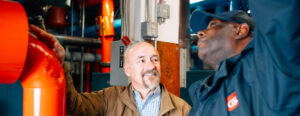
Looking back, what have been some key milestones or achievements that define CGL’s journey?
Joe Lee: What really stands out are the long-term relationships and friendships we’ve built with clients, such as Clayton County, the Georgia Department of Corrections, and numerous counties across Pennsylvania. Clayton County, our very first client, is still with us 30 years later, and they’ve come to us again for upgrades. Getting those projects that are well-recognized and looked at by many in the justice community as being the bellwether of what is to come, have been the milestones.
Another key milestone was demonstrating our capability to manage large justice facilities. Maintaining 1,000,000-square-foot facilities was a game-changer. We built upon this milestone by expanding the maintenance services to planning and program management. We could take potential clients on tours and show them the work we had done, leaving them shocked to hear that 10- to15-year-old buildings looked brand new.
What are the core values or principles that have contributed most to CGL’s longevity and success?
Joe Lee: The two that are the most meaningful and have stood the test of time are “doing the right thing” and “making it better.” One story that exemplifies this is when Tim Tanner, one of our staff, offered his church as shelter for those who couldn’t go home during a hurricane. That still sends cold chills up and down my spine – a very, very humanitarian thing to do.
The second value is making things better. A lot of the facilities we work in are in bad shape when we get there, and we take pride in improving them for both the staff and the inmates. It’s about creating a better environment for everyone involved.
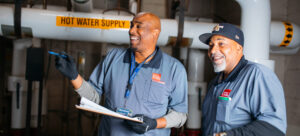
I really appreciate the examples that you’re giving because they highlight one of the great things I’ve experienced since joining the company—the values shared and the effort made to provide value to clients while caring about people. It’s been a big part of why I’ve enjoyed being with CGL.
Joe Lee: Absolutely, and there are many more examples.
There have been many changes in justice trends and technologies over the years. What have you seen evolve and how has CGL adapted?
Joe Lee: The biggest trend change is that we don’t have to work as hard to convince people that maintenance services are essential anymore. About five years ago, clients started coming to us, recognizing the value we bring—whether it’s through data, responsiveness, or the positive impact on their facilities and the people who work or are incarcerated there. They’re now coming to us saying, “we’re interested in you providing maintenance services for us.” It’s become a much easier conversation to have.
On the technology side, we’ve evolved significantly. Early on, we implemented a computerized maintenance management system (CMMS) in one of our largest buildings. At that time, we didn’t realize the software came with a preventive maintenance library, so our team manually input all the maintenance requirements—a process that took quite a while, considering there were probably 20,000 to 30,000 pieces of equipment.
Since then, we’ve made significant progress. We’ve improved the way we use the CMMS, ensuring it’s used correctly for both our benefit and our clients’. The data we collect is now instrumental in guiding clients through their building’s lifecycle and in predicting long-term costs. This technological advancement allows us to provide real data and insights, helping clients make informed decisions and enhancing the overall efficiency of facility management.

Celebrating 50 years is significant. What does this anniversary mean to you personally, and what does it signify for the future of CGL?
Joe Lee: It’s very meaningful to me. I met Steve Carter in 1981 when I first entered the corrections business.
We met at a jail and Steve said, “we’re going in to do some interviews with inmates and officers.” First time I’d ever been to a jail. We walked into a living unit and I noticed that none of the correctional officers were around us; I also noticed that the inmates seemed agitated. Come to find out they had not seen sunlight in four months; they had not been afforded outdoor recreation, which was required by the American Correctional Standards. So, I’m sitting there a little nervous, while Steve was very calm. The conversation would get very intense and then it’d calm down. Steve was talking to these inmates and writing down what the problems were, and I’m sitting there with my eyes wide open, like, “I’m not going to get out of here.”
Our paths crossed many more times over the next 10-13 years. In 2000, my wife Donna and I had a conversation with Steve about combining our firms. We shared a vision of making things better for clients by offering a continuum of services—maintenance, program management, planning, design, and operations expertise.
Now, at our 50-year milestone, we’re in the best position we’ve ever been. We offer a wide array of services that make us unique in the world. We’ve come a long way, and the company is in a phenomenal position to keep growing, fulfilling its mission to serve clients, employees, and communities with excellence and humanity.
I know ‘client satisfaction’ is one of your top values. Can you describe a memorable project or client engagement that reflects CGL’s commitment to excellence in service?
Joe Lee: Forsyth County stands out to me. We had an engaged client, a great jail administrator, and a beautiful building that’s still impressive today. The innovative design—like the central plant that serves both the courthouse and jail across the street—was efficient and cost-saving.
We were able to demonstrate leadership and commitment by “doing what’s right,” which is one of our core values to this day. Originally, the client was planning a 900-bed jail without knowing why. After looking at inmate population projections and demographics, we advised them to build a 600-bed jail instead, which turned out to be the correct decision. This project showcased many of our core values: leadership, service, and caring for people.
How does CGL differentiate itself from competitors in the industry?
Joe Lee: We have a uniquely wide array of services that no one else offers, that’s one.
But most important, we are always about doing the right thing. I mentioned the 900-bed jail earlier—we convinced them to build a 600-bed facility because it was the right thing to do, even though it meant a smaller contract.
I think we’re also differentiated from the standpoint that we truly care about all the inhabitants of these facilities, from correctional officers, to incarcerated persons, advocates, and service people, etc. With only a twist of fate, any of us could end up in one of these institutions, and we treat it that way. We take a humanitarian approach to make facilities safe and secure for everyone, and that’s what makes us unique. And that’s not making a political statement; that’s making a humane statement.

‘Doing the Right Thing’ has been a core value of the company since day one and continues to this day.
Looking forward, what are your aspirations or goals for the company in the next decade?
Joe Lee: To continue to grow and provide more opportunities for our employees and clients. We’re diverse now, but we can add more diversity and benefit from it. CGL has adapted to change year after year, and I see nothing but good things in our future.
How do you envision sustainability and environmental responsibility shaping the future operations of CGL?
Joe Lee: Well, I drive an electric truck. I think environmental responsibility is important and sustainability is a key factor going forward. I think I’m a closet tree hugger, maybe. I want the environment to be like I remember it when I was younger.
At CGL, we’re ensuring the systems we recommend and maintain are top-notch in efficiency and sustainability, which is one of our hallmarks. Our expertise in life cycle costing allows us to make smart decisions for our clients from the very start of a project. We can talk to people and clients about those decisions in layman’s terms to the point that they get it. We guide the client from initial planning and design, and throughout the construction phase ultimately to the end of the building’s lifecycle, ensuring sustainability and efficiency are always top of mind.
That’s what makes our business service array so unique is that we can advise people at the very front end of the contract. The decisions you make at the very beginning that have to do with maintenance and sustainability are as important as fundamental decisions you’re making about managing inmates, managing staff, and securing the building. I think we’ve got all the expertise to make the most efficient building that you can design.
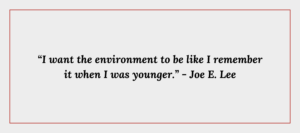
Reflecting on your journey, what are you most proud of when you think about CGL’s impact on its clients, employees, and community?
Joe Lee: When we started our company, a lot of people doubted we could succeed. Now, with almost 500 employees and clients coming directly to us, none of our competitors match what we offer. We’ve made ourselves unique. We’ve made ourselves the leader in our field; and our business model, as well as our culture, is something to which others aspire. I foresee nothing but growth going forward. I’m very, very proud to have contributed to that success in some way.
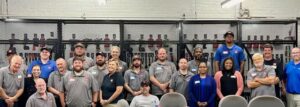
Team members of CGL FM in Virginia.
A Successful Journey Through Facility Maintenance Excellence
As we celebrate 50 years of excellence, we’re excited about what the future holds. The commitment to innovation, sustainability, and humane practices positions CGL to continue making a positive impact on clients, employees, and communities for years to come.
Stay tuned for the next installment of our “50 Years Strong” series, where we’ll explore the history and growth of CGL’s role in owner’s representation and how we’ve guided clients through complex projects with expert oversight and support. The journey continues, and we look forward to sharing more stories of our growth and success.
